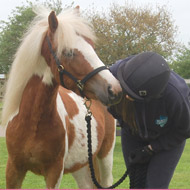
Members have the required handling and riding experience
The Pony Club has pledged its support to help find new homes for a group of unowned, semi-feral ponies rescued from Bodmin Moor.
Last September, Redwings Horse Sanctuary led a multi-agency operation to round up, health check and microchip as many ponies from the Moor as possible.
Ponies that were unclaimed by any owners were removed using the Control of Horses Act 2015 and taken in by Blue Cross, Redwings and other charities for rehabilitation and many are now ready for rehoming.
The Pony Club says that its members are often a perfect fit for rescued ponies that need suitably knowledgeable homes, so the organisation is actively supporting the appeal via social media.
“Over the years Blue Cross has had some great rehoming successes through The Pony Club because their members tend to have the handling and riding experience some of our rescued ponies need,” commented Tess Scott-Adams, rehoming centre manager at Blue Cross Rolleston.
“Many Blue Cross ponies have gone on to become highly sought after competition ponies thanks to their Pony Club homes and we are hoping that some of our lovely Bodmin ponies will follow in their footsteps”.
Pony Club chairman, Mary Tuckett, added: “The Pony Club is delighted to be backing Blue Cross in their appeal to find homes for the ponies rescued from Bodmin Moor.
“The work of the Blue Cross is truly remarkable, and we have seen numerous horses and ponies re-homed with Pony Club families throughout the years; a number of which have gone on to compete at Championship level.
“We hope we have helped improve the lives of these horses and ponies, and others in the future by advertising them on the classified section of our website.”
Image (C) Blue Cross.



 BSAVA is to partner with BVA Live (11-12 June 2026) to champion clinical research.
BSAVA is to partner with BVA Live (11-12 June 2026) to champion clinical research.